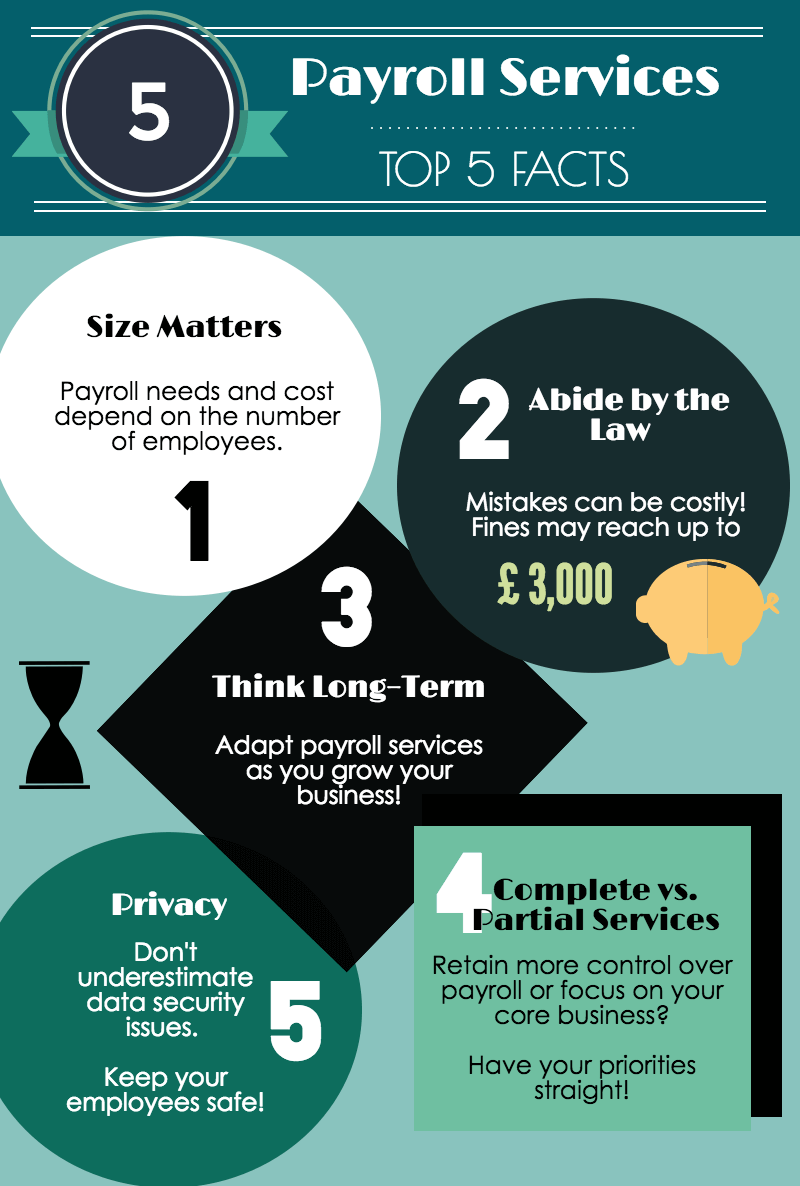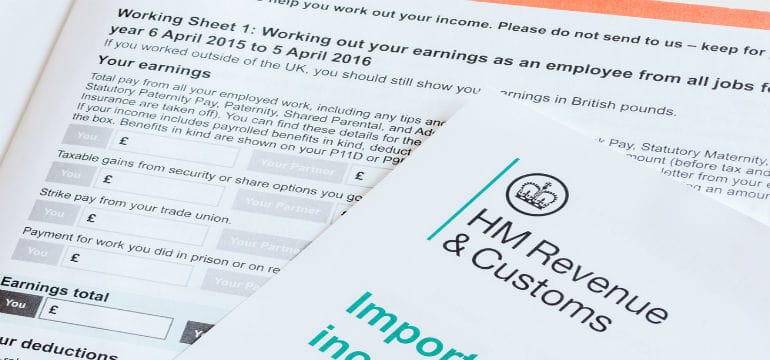- Market-Inspector.co.uk
- Payroll Services
Payroll Services
What Are Payroll Services?
Payroll services refer to the processing of employee payments by an external company. Essentially, the term denotes the outsourcing of payroll management.
External payroll providers carry out all necessary payroll services including, but not limited to employee payments via BACS, calculation of taxes, wage deductions and the filing of all payroll reports to the HMRC in compliance with governmental regulations.
Hiring a payroll service company eliminates the need for a full-time in-house specialist. By outsourcing payroll you can save time and money on expensive payroll software and staff training that can be better invested in growing your company.
- How do payroll services work?
- How much do payroll services cost?
- Why is payroll management important?
- What is payroll software?
- How can payroll services help your business?
- Flexible payroll services for small businesses
- Types of payroll services
- Payroll outsourcing: pros and cons
- Find the best payroll service in the UK
How Do Payroll Services Work?
You simply supply the payroll company with your personnel’s details and they run the complete payroll for you. Keeping records of your staff is your only responsibility. At the end, you are provided with comprehensive reports.
As an employer you are free to decide whether to manage an in-house payroll system or hire a payroll service provider who specialises in accounting and book-keeping. This decision will of course depend on your company’s size and financial situation.

How Much Do Payroll Services Cost?
Payroll service pricing will vary largely depending on the size and needs of your business. An estimated average price for a small company amounts to about £4 per employee, per month, on top of a setup base price. In time, as your company grows bigger, you might be able to take advantage of economies of scale. For instance, for large organisations with around 500 employees, the payroll services cost may drop to £2.50 per person.
Payroll services are usually charged monthly, based on the number of people employed. However, it is also possible to request weekly or bimonthly processing. Further, some providers offer basic packages for small businesses starting from an average flat rate of £30 per month.
Why Is Payroll Management Important?
In the UK, every employer is obliged to keep records of all payments and deductions made to their employees, and submit a return to the HMRC every time employees are paid. Failing to do so can lead to a sanction of up to £3,000.
A reliable payroll manager will stay on top of the ever-changing legislation and ensure timely and correct payments. By handling your employees’ payroll with diligence you will not only avoid repercussions but foster loyalty among your staff.
What Is Payroll Software?
Payroll software performs automatic processing of employee wages, calculating either on an hourly or salary basis. Nowadays, most software on the market operates in a cloud, allowing 24/7 access to the system from multiple devices. Online software further ensures safe storage of all your data and automatic back ups.
The official UK government website provides a list of free payroll software for small businesses that employ less than 10 people. Assuming you possess the necessary knowledge in accounting and HR matters, installing your own software instead of outsourcing payroll services could potentially prove beneficial.
Not all payroll software however performs well on user friendliness. Paid versions can be even more complicated to operate than free ones, because they include extra features, and are designed to accommodated huge amounts of data.
Larger enterprises that are purchasing complete ERP (Enterprise Resource Planning) packages, will most likely have payroll software included in it. If this is not the case, you have to make sure that the software you buy is compatible with existing systems, like CRM and POS. Full compatibility will allow for smoother transfers of data, and will leave less room for error.
If you want to know more about how to use payroll software, you can watch this video created by the UK government:
How Can Payroll Services Help Your Business?
Payroll services include a number of features that can be tailored to your specific needs. A basic payroll solution will usually provide:
Flexible Payroll Services for Small Businesses
Small businesses and startups often experience exponential growth once they turn profitable. But, with profit come expenses; a good payroll system should account for all ongoing changes and support the growing number of employees effectively.
Giants in the market like ADP payroll services have a broad portfolio of solutions that will fit most businesses throughout their development. For example, you can start off with ADP Expert plus, which is suitable for a firm with up to 150 employees.
ADP freedom payroll also operates on two levels. It offers the flexibility of adding on services as you grow. More importantly, a self-service option for employees is integrated, alleviating your workload significantly.
These are just some of the numerous options available. There is no one-size-fits all solution to your payroll needs. For that, you must familiarise yourself with the types of services on the market.

Types of Payroll Services
Payroll services are available for all types of businesses, no matter the size.
Bigger corporations, usually run in-house payroll systems as they have the capacity and resources to maintain a payroll software of their own. However, this does not mean that large businesses have nothing to gain from payroll outsourcing. Refocusing human capital from the payroll department to revenue generating operations is likely to prove even more profitable.
Smaller and medium sized companies with less experience and limited time, usually benefit the most from the services of payroll providers. They can take advantage of the experts’ knowledge and concentrate on developing their core business.
Complete Payroll Services
Fully managed payroll services cover everything from A to Z, and even more, if desired.
All filling with the government will be taken care of on the employer’s behalf. Payslips will be sent out to all employees in print and/or electronic form, together with P60 forms. Other forms like the P9D, for employees earning less than £8,500, and P11D, informing authorities of the Class 1 National Insurance owed, will also be submitted.
As an employer, your only obligation will be to communicate any changes in staff composition on time and review the reports generated for you by the payroll manager.
Integrated HR Services
It is evident that payroll functions and HR are closely related as they both deal with the management of people. In fact, in most organisations payroll managers report to the head of HR. Seeing how both HR and payroll require knowledge in employment law, it makes sense to maintain a close cooperation between the two.
Some payroll companies like ADP offer add-on services like expert advice on HR matters and employment law. Their ADP HR Knowledge Base grants around the clock online access to standard procedure forms and answers to common legislation queries.
Partial Payroll Services
Under a partly managed payroll service employers are granted access to the provider’s payroll software and undertake the data submission and information updates themselves, while still benefitting from the experts’ advice.
This method is sometimes referred to as ‘payroll bureau services’. Ultimately, it brings the advantage of exercising more control over the payroll process, while still being able to call on consultants for troubleshooting. It is thus recommendable for employers with previous experience in payroll management.

Payroll Outsourcing: Pros and Cons
Deciding whether to outsource payroll processing services or run in-house payroll operations is a highly individual decision. There are both advantages and disadvantages to consider. This list is meant to guide and help you find the best solution for your business.
4 Pros of Payroll Outsourcing
1. Reduce Error
Calculation mistakes can not only prove very costly, but can sometimes bring about fraud investigations, damaging your company’s reputation. Having a payroll manager in charge with years of experience that will stay atop of any legislative changes will significantly reduce the chance of error.
2. Save Time
Outsourcing frees up time and human capital that can be redirected to revenue generating operations and more pressing matters.
3. Minimise Expenses
Payroll outsourcing will most certainly prove cost effective for small and medium sized enterprises as they will save on purchase and maintenance of expensive payroll software. And don’t forget about the small things! Even mundane administrative tasks like printing and producing tax documentation pile up over time, and can be worth outsourcing.
4. Transparency
Payroll pricing is always established in advance, which makes planning and budgeting a breeze.
3 Cons of Payroll Services
1. Privacy
Outsourcing inevitably involves handing over sensitive information to a third party. In such cases, there is always a risk of your employees’ personal information such as bank account numbers and National Insurance numbers being abused. Hence, finding a reliable and trustworthy partner must be your first priority!
2. Responsibility
Even if you hire an external payroll service provider, the employer still carries the full responsibility for filling correct and timely reports with the HMRC and will be held accountable for any inaccuracies.
3. Hidden Costs
Buying an all-inclusive service package is the simplest way to go, but it also makes it easy for your provider to sneak in unnecessary services that don’t bring value to your business. So, make sure you read the fine print!

Find the Best Payroll Service in the UK
The market for payroll services is extremely competitive, and filtering through all the available options can seem overwhelming at first. The following points should offer some guidance in making a well-informed decision.
Establish Good Relations
A good payroll service manager should take the time to get to know your company inside and out before making any recommendations. The employer also carries the responsibility of ensuring clear communication. Then, forgetting to inform your payroll manager about a new addition to your team means he/she won’t get paid on time.
Know Your Payroll Needs
With every additional service, the cost will naturally increase. And you don’t want to be paying for something that does not bring value to your company. Thus, before entering into negotiations with potential service providers you will need a clear overview of all essential and custom payroll functions that your business demands.
These are just some question to take into account, when doing your research:

Consider Future Costs
Long-term planning is essential before committing to a specific pricing scheme or payroll package. What if your company grows significantly in a short period of time? How will that affect your payroll system? Do you intend to expatriate employees and what rules apply in such cases?
What you will need is a payroll provider that is able to keep up and adjust to your company’s needs. But changing providers in the middle of the financial year may cause even more troubles. Switching to a new payroll software can be tricky as all data has to be backed up while preventing duplicate information and payments.
Don’t forget about the implementation period either! Setting up a payroll system for SMEs can take up at least a couple of months. This time frame will increase by all preliminary planning activities.
We strive to connect our customers with the right product and supplier. Would you like to be part of Market Inspector?

- How do payroll services work?
- How much do payroll services cost?
- Why is payroll management important?
- What is payroll software?
- How can payroll services help your business?
- Flexible payroll services for small businesses
- Types of payroll services
- Payroll outsourcing: pros and cons
- Find the best payroll service in the UK
